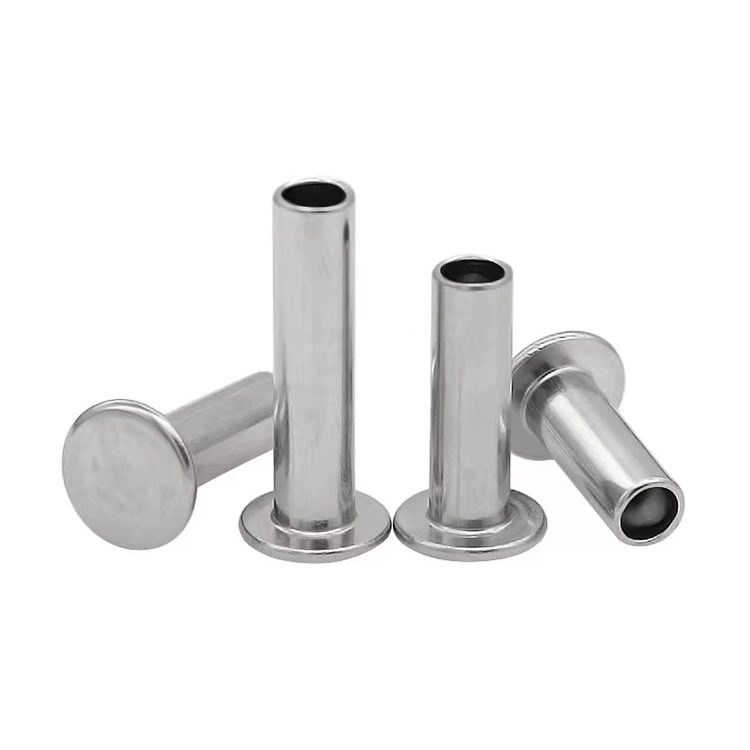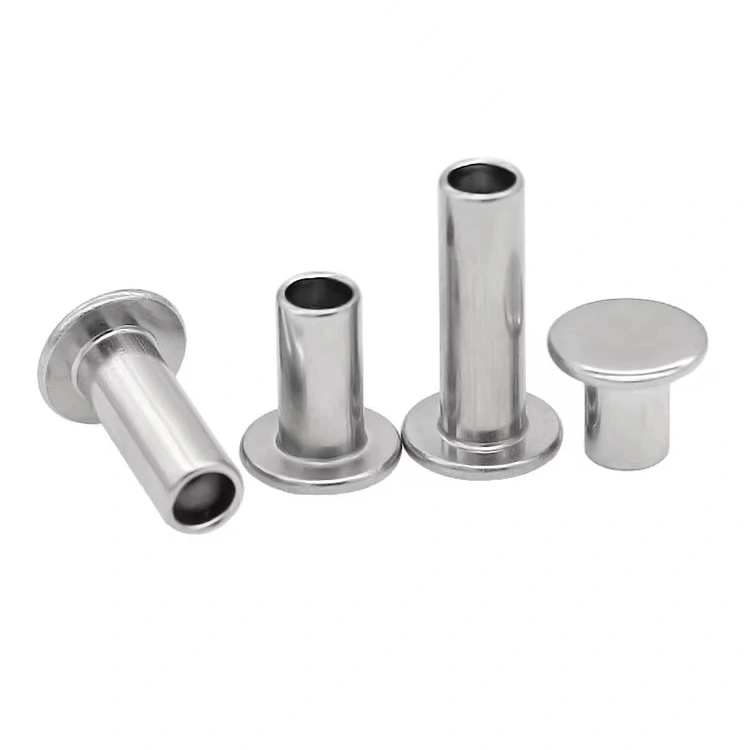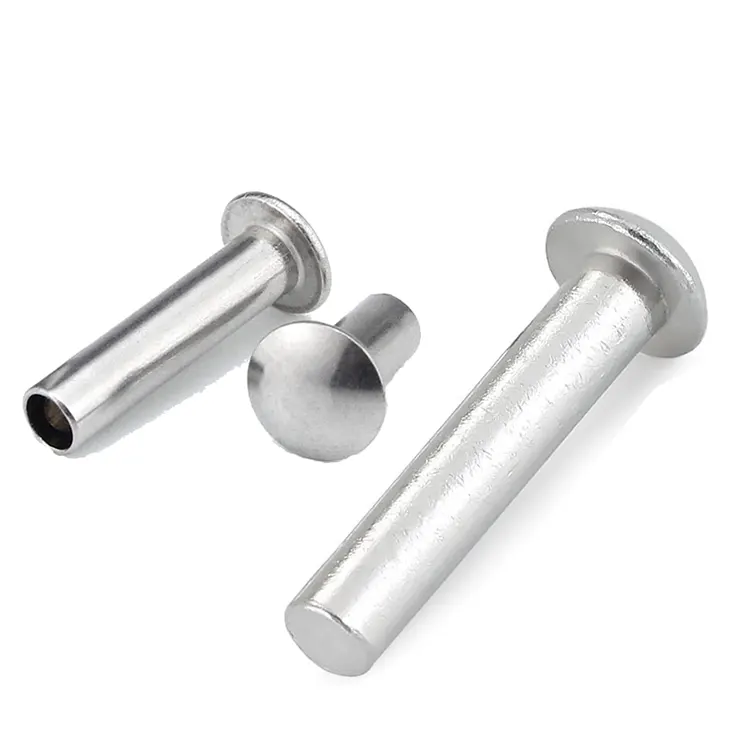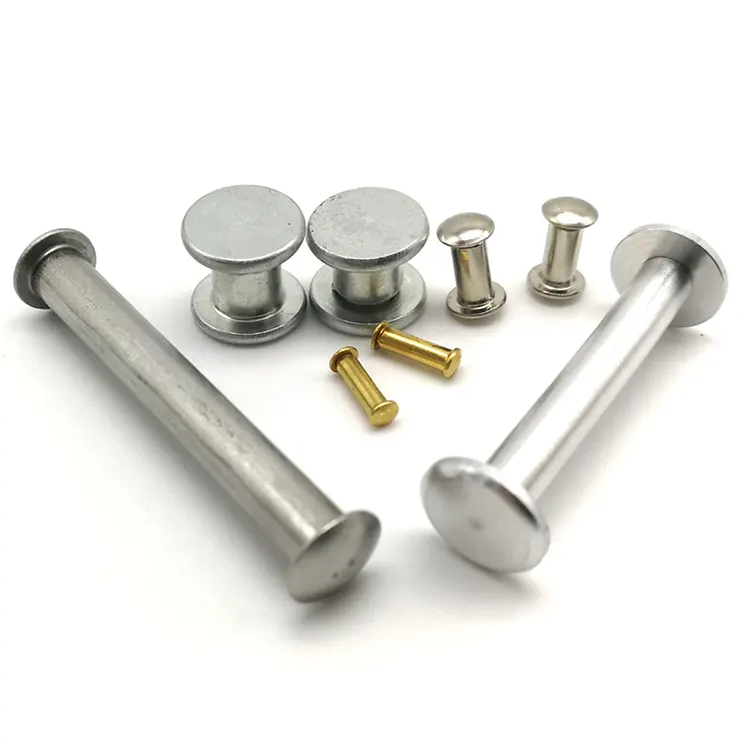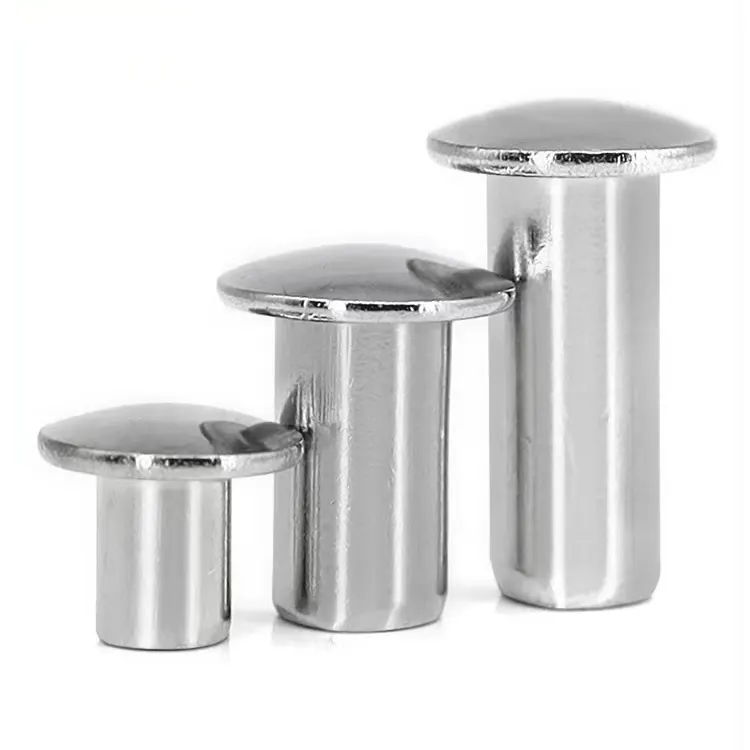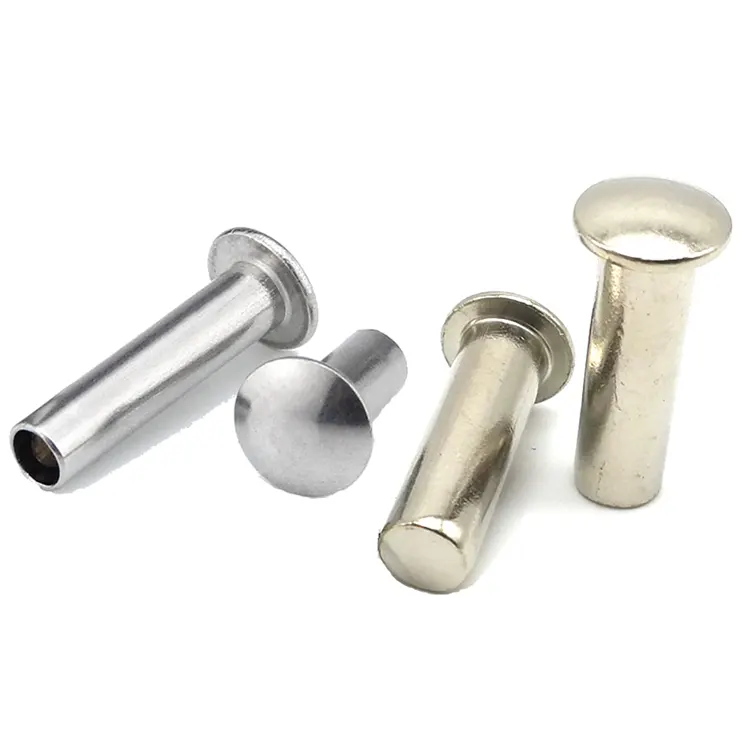Nitter
As one of professional manufacturer in China, Notin would like to provide you Rivets. And we will offer you the best after-sale service and timely delivery.
What is a rivet?
A rivet is a permanent mechanical fastener used to join two or more materials. Rivets work by inserting a metal pin into an aligned hole and deforming the end, creating a strong, secure, and durable connection. Unlike temporary fasteners like screws, rivets do not rely on threads, but instead form a permanent connection, making them ideal for applications requiring high strength, durability, and vibration resistance.
Classification of Rivets
Rivets are typically categorized by head shape, degree of hollowness, or material.
Based on head shape, rivets can be classified as flat head rivets, round head rivets, countersunk head rivets, mushroom head rivets, universal head rivets, truss head rivets, etc.

Based on degree of hollowness, rivets can be classified as solid rivets, semi-tubular rivets, or full tubular rivets.
Based on material, rivets can be classified as brass rivets, stainless steel rivets, steel rivets, aluminum rivets, copper rivets, etc.
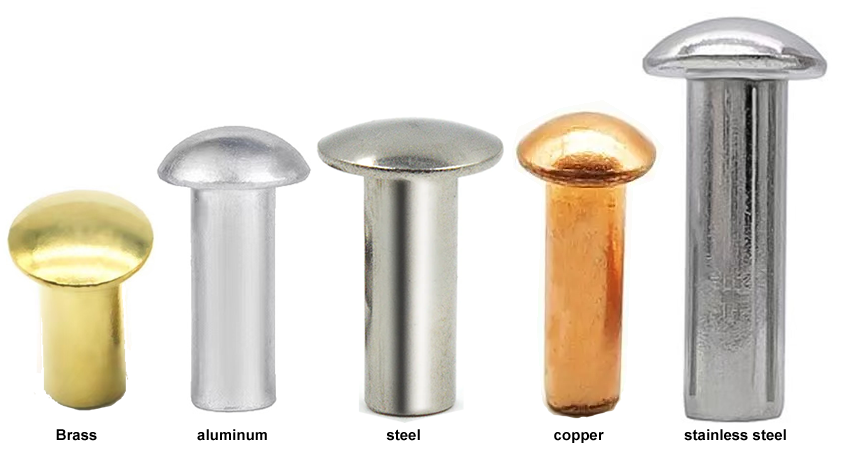
What surface finishes are available for rivets?
Rivet surfaces are typically treated with rust-proofing treatments, primarily electroplating, including zinc plating, nickel plating, chrome plating, tin plating, gold plating, and silver plating. Electroplating is a common rust-proofing method for rivets. It applies a layer of plating to the rivet surface through physical or chemical methods. The plating effectively prevents corrosion and rust, while also providing a certain aesthetic effect.
Another special surface treatment method is head coating. Head coating is performed after the rivet is electroplated. This allows for a variety of colors on the rivet head, achieving an aesthetically pleasing finish.
Aluminum rivets cannot be electroplated, but they can be anodized. Anodizing also allows for a variety of color options, but the unit price is higher than electroplating.
Rust-proofing the rivet surface is crucial, effectively extending the rivet's service life and ensuring a secure connection. Different rust-proofing methods are suitable for different environments and applications, so the choice should be tailored to the specific situation.
- View as
Halvrørsnitter af aluminium
Vi er Nuote Metals, en nitterproducent baseret i Dongguan, Kina, og vi sender vores nitter til hele verden. Halvrørsnitter af aluminium er en meget almindelig type mekanisk fastgørelse, der bruges i tonsvis af forskellige industrier. De har et solidt hoved og en hul hale, som giver en hurtig og solid forbindelse, når du nitter dem på plads. Disse nitter er normalt lavet af aluminiumslegering, så de er lette og ruster ikke let.
Læs mereSend forespørgselHalvrørsnitter
Hej, lad mig fortælle dig om disse halvhule aluminiumnitter. De er dybest set bare små metalstik lavet af aluminium. Den fede del? De er designet med et delvist hulrum, der ikke går hele vejen igennem. Den ene ende kommer klar med et hoved, og du bruger bare et specielt værktøj til at banke den anden ende - det får den til at spredes ud og holde tingene fast. Det er som at få styrken af solide nitter med den nemme installation af hule. Perfekt, når du har brug for ting lette, men tæt forseglet. Og aluminium? Den er let, ruster ikke og forbliver stærk.
Læs mereSend forespørgselUniversalhovednitter
En universalhovednitte er en type mekanisk forbindelseskomponent i nitteklassifikationssystemet. Dens hoved har en flad bueformet struktur og er velegnet til sammenføjning af materialer som tynde metalplader, læder, lærred og træ. Denne type nitte er fastgjort gennem kolde eller varme nitteprocesser og har fordelene ved nem installation og omkostningseffektivitet i ikke-forseglede trykbærende miljøer. Sammenlignet med lignende produkter såsom forsænkede nitter, er universalhovednitter mere velegnede til nitning af tynde metalplader eller ikke-metalliske materialer som læder, lærred og træ på grund af deres fremspringende halvkugleformede hoveddesign.
Læs mereSend forespørgselTodelte nitter
Todelte nitter består typisk af to dele: en hunnitter og en hannitter. Hunnitten har et indvendigt hul i den ene ende og en fast ende i den anden. Den mandlige nitte, som en solidtrinnitte, passer ind i det indvendige hul på hunnitten. For at bruge, skal du først fastgøre hunnitten til en genstand, derefter indsætte hannitten i hunnitten og hamre den på plads, hvorved de to genstande forbindes. Dette design forenkler installationen og giver samtidig pålidelig forbindelsesstyrke. Nuote Metals har 10 års erfaring med denne slags todelte nitter, velkommen til at sende os din tegning.
Læs mereSend forespørgselTruss Head nitter
Nuote Metals fremstiller og sælger truss head nitter. Vi er beliggende i Dongguan, Kina, og vi har over 40 maskiner med kold retning, der er i stand til at producere en bred vifte af nittespecifikationer og -typer. Vi tilbyder også skræddersyede nitter. Truss hovednitter er en almindelig nittet komponent, der består af et skaft, hoved og hale. De er kendetegnet ved et stort, fladt hoved og en hul eller solid hale, hvilket giver fremragende tætnings- og vandtætningsegenskaber.
Læs mereSend forespørgselStålnitter med rund hoved
Nuote Metals fremstiller og sælger stålnitter med rund hoved i en række forskellige finish, herunder zinkbelægning, fornikling og Dacromet-belægning. Nitter med rund hoved har en halvcirkulær hovedform, der tilbyder fremragende træk- og forskydningsstyrke, der er i stand til at modstå store belastninger. Det runde hoveddesign gør det muligt for nitten bedre at tilpasse sig forbindelseskomponenten under forbindelsen, hvilket forbedrer samlingens stabilitet og tætning.
Læs mereSend forespørgselWhat are the advantages of rivets over other fasteners?
1. Ease of Installation
Rivets are fast to install, and even fully automated for high-volume applications, resulting in a simple and efficient operation process.
2. Connection Reliability
The riveting process is standardized, with strict quality control, resulting in highly stable connections. Visual inspection allows for quick verification of connection quality.
3. Vibration and Impact Resistance
Rivets connect through deformation or interference fit, providing strong clamping force and excellent vibration resistance, capable of withstanding vibration and shock.
4. Low Cost
Rivets are easy to install and can be fully automated, saving significant labor costs.
What are the advantages and disadvantages of rivets made of different materials?
Aluminum Rivets
Advantages: Lightweight, reduces overall product weight, low cost, suitable for general civilian applications.
Disadvantages: Low tensile and shear strength, unsuitable for high-strength workpieces, prone to electrochemical corrosion when in contact with metals such as stainless steel.
Stainless Steel Rivets
Advantages: Strong corrosion resistance, high hardness, suitable for high-strength workpieces (such as marine equipment)
Disadvantages: Higher cost, typically more expensive than aluminum rivets of the same specification.
Brass and Copper Rivets
Advantages: Excellent conductivity (such as connecting electronic components), good corrosion resistance.
Disadvantages: Higher cost, more difficult to process.
Steel Rivets
Advantages: High hardness, high connection reliability, and wide applicability.
Disadvantages: Compared to other materials, iron rivets are more prone to rusting.
What are the main applications of rivets?
Rivets have a wide range of uses, from small items like a pair of scissors to large items like airplanes and ships, as well as in high-precision medical applications.
Industrial Manufacturing
Rivets are used in a wide variety of industrial fields, wherever there is a need to connect two or more materials.
Electronics
Rivets secure heat sinks and chips, providing both vibration damping and noise reduction, and are widely used in the cooling systems of electronic products such as computers and mobile phones.
Automotive
Rivets are widely used to connect components of automobile bodies and chassis, such as doors and hoods. Their lightweight and corrosion-resistant properties make them an indispensable joining method in automotive manufacturing.
Aerospace
In aircraft manufacturing, rivets are used to connect different fuselage components, such as wings and tailplanes. Millions of rivets create high-strength, corrosion-resistant joints. Aluminum and titanium alloy rivets are often used to connect components of corresponding materials, ensuring stability in extreme environments.
Rivets are used everywhere. The above examples only represent a small number of their applications. We see rivets everywhere in our daily lives, such as on scissors, folding beds, and strollers etc. Rivets can be customized to different sizes and materials depending on the application.
Nuote Metals has specialized in the rivet industry for over a decade. Our factory is located in Dongguan, a city known as the "World Factory," a city with a developed industry and convenient transportation. This allows us to respond quickly when acquiring raw materials and supporting surface treatments, meeting our customers' needs for quick access to samples and bulk orders. We produce 10 million rivets daily and have molds of various specifications, allowing us to produce rivets as small as 0.8mm and as large as 10mm. We welcome your inquiries and visits.







